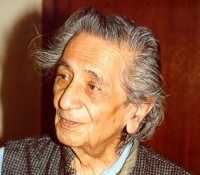Bhisham Sahni (8 August 1915 – 11 July 2003) was an Indian writer, playwright in Hindi and an actor, most famous for his novel and television screenplay Tamas ("Darkness, Ignorance"), a powerful and passionate account of the Partition of India. He was awarded the Padma Bhushan for literature in 1998, and Sahitya Akademi Fellowship in 2002. He was the younger brother of the noted Hindi film actor, Balraj Sahni.
During his lifetime, Bhisham Sahni won several Awards including Shiromani Writers Award,1979, Uttar Pradesh Government Award for Tamas, 1975,Colour of Nation Award at International Theatre Festival,Russia for Play Madhavi by Rashi Bunny,2004, Madhya Pradesh Kala Sahitya Parishad Award, for his play 'Hanush', 1975 the Lotus Award from the Afro-Asian Writers' Association, 1981 and the Soviet Land Nehru Award, 1983, and finally the Padma Bhushan for literature in 1998, Shalaka Samman, New Delhi 1999=2000, Maithlisharan Gupta Samman, Madhya Pradesh, 2000–2001, Sangeet Natak Academy Award 2001,Sir Syed National Award for best Hindi Fiction Writer 2002, and India's highest literary award the Sahitya Akademi Fellowship in 2002.
On 31 May 2017, India Post released a commemorative postage stamp to honour Sahni.
Bhisham Sahni's epic work Tamas (Darkness, Ignorance 1974) is a novel based on the riots of 1947 Partition of India which he witnessed at Rawalpindi.[3] Tamas portrays the horrors of senseless communal politics of violence and hatred; and the tragic aftermath – death, destruction, forced migration and the partition of a country. It has been translated to English, French, German, Japanese and many Indian languages including Tamil,Gujarati, Malayalam, Kashmiri, and Manipuri. Tamas won the 1975 Sahitya Akademi Award for literature and was later made into a television film in 1987 by Govind Nihalani. Two of his masterpiece stories, Pali and Amritsar Aa Gaya Hai, are also based on the Partition.
Sahni's prolific career as a writer also included six other Hindi novels: Jharokhe (1967), Kadian (1971), Basanti (1979), Mayyadas Ki Madi (1987), Kunto (1993) and Neeloo, Nilima, Nilofar (2000)., over hundred short stories spread over ten collections of short stories, (including Bhagya Rekha (1953), Pahla patha (1956), Bhatakti Raakh (1966), Patrian (1973), Wang Chu (1978), Shobha Yatra (1981), Nishachar (1983), Pali (1989), and Daayan (1996) ; five plays including Hanoosh, Kabira Khada Bazar Mein, Madhavi, Muavze, Alamgeer, a collection of children's short stories Gulal ka keel'. But his novel named Mayyadas Ki Mari (Mayyadas's Castle) was one of his finest literary creation, the backdrop of this narrative is historical and depicts the age when the Khalsa Raj was vanquished in Punjab and the British were taking over. This novel is a saga of changing social order and decadent set of values.[4] He wrote the screenplay for Kumar Shahani's film, Kasba (1991), which is based on Anton Chekhov's story,In the Gully. Although Sahni had been writing stories for a long time, he received recognition as a story writer only after the publication of his story ‘Chief Ki Daawat’(The Chief’s Party) in the Kahani magazine in 1956.
Bhisham Sahni wrote his autobiography Aaj Ke Ateet (Today's Pasts, Penguin 2016) and the biography of his brother Balraj Sahni, Balraj My Brother (English).
NaN
